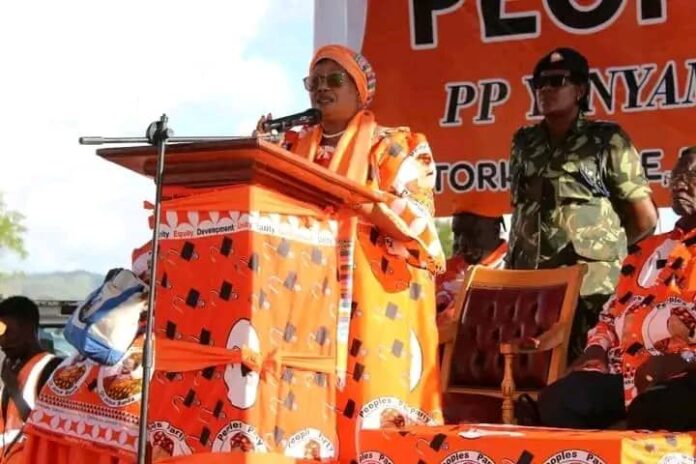By Burnett Munthali
Former President Joyce Banda today visited Ntchisi, where she delivered a fiery critique of the current administration under President Dr. Lazarus Chakwera.
In her speech, Banda expressed deep concern over the deteriorating living standards that many Malawians are experiencing across the country.
She drew a stark comparison between her time in office and the present leadership, emphasizing that her administration, despite inheriting serious economic challenges, managed to stabilize the economy and restore hope.

Banda accused President Chakwera of making things worse for ordinary Malawians instead of building on the gains made by previous governments.
She pointed to rising prices of basic commodities, fuel shortages, and an unmanageable cost of living as evidence that the current government has failed to deliver on its promises.
According to her, there is a growing sense of despair among Malawians who had placed their trust in the Tonse Alliance, only to be met with frustration and economic hardship.
The former president also criticized the lack of transparency and accountability within the Chakwera administration, arguing that corruption and nepotism have taken root while citizens suffer.
She said that Malawians have been let down by leaders who prioritize political survival over the wellbeing of the people.
In what seemed like a political rallying cry ahead of the 2025 elections, Banda urged citizens to rise up and demand change, asserting that they deserve better governance.
She told the crowd in Ntchisi that when she led the nation, there was a deliberate focus on inclusive policies aimed at poverty reduction and social protection.
Banda cited specific programs from her presidency, such as social cash transfers and women economic empowerment initiatives, which she said were designed to cushion the most vulnerable groups in society.
She challenged President Chakwera to explain what tangible impact his administration has made since taking over the reins of power.
The former president further alleged that the current regime has failed to manage donor relations effectively, which has resulted in loss of confidence and dwindling international support.
She lamented that Malawi’s global reputation has suffered under the Chakwera leadership, making it more difficult to attract development assistance.
Banda warned that if nothing is done urgently, the country risks sliding deeper into an economic abyss that will take years to recover from.
She emphasized that the Tonse government’s inability to manage public resources wisely is partly to blame for the worsening fiscal deficit and rampant public debt.
Banda also took time to highlight the struggles of rural communities, particularly in districts like Ntchisi, where access to clean water, healthcare, and agricultural inputs remains limited.
She said the government must stop paying lip service to development and instead deliver real solutions that improve people’s lives.
The former president said she is heartbroken to see people queuing for maize in long lines while the government looks the other way.
She said this was not the vision she fought for, and she cannot remain silent while Malawians continue to suffer.
Joyce Banda reminded the audience that leadership is about service, not self-enrichment, and that the country needs leaders who walk the talk.
She called on all progressive forces to unite and rescue Malawi from what she described as a “sinking ship.”
Banda’s remarks are likely to spark political debate as the country heads toward a heated electoral season ahead of the September 16 Convention and the 2025 general elections.
Her statements reflect growing dissatisfaction within the political opposition and among ordinary citizens who feel betrayed by the current leadership.
Whether or not her message resonates nationwide, one thing is clear—Malawi is at a crossroads, and the voices calling for change are growing louder.



